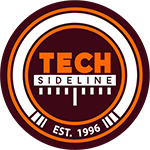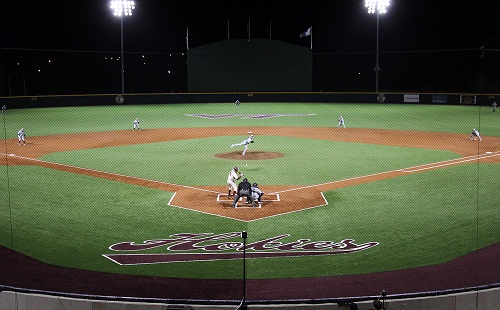Editor’s note: This will be Jacob Emert’s final series for TSL. He graduated from Virginia Tech in May, and is now covering the Washington Nationals for MLB.com. If you’re a Nats fan, follow him on Twitter at @JacobEmert.
Before Virginia Tech’s 2015 season came to an end, I sat down for the better part of 40 minutes with pitching coach and recruiting coordinator Rob Woodard. We discussed several topics surrounding recruiting in college baseball.
(Jacob Emert): As recruiting coordinator, how do you balance coaching with recruiting?
(Rob Woodard): This Spring I’ve been here more. Last spring, I was probably there for three or four Thursday practices. This spring I’ve been here for most Thursday practices. There have been, for whatever reason, less rainouts.
See, Virginia high school games play on Tuesday and Friday, so you try to lock in on the rainouts and if they make them up on Wednesday or Thursdays or Mondays you try to get to those games. This season we’ve tried to be at as many practices as we can and work with our guys and communicate with guys more rather than getting to high school games. And it’s tough too, because high school games, we can drive six hours to see a kid that we really know we want to see and he may be facing 75-mph fastballs that day. And it can be tough on that end, so you start to weigh is it really worth missing practice and working with your guys over seeing that? So I’d say we’ve definitely put more emphasis on practice and working with our guys here on Thursdays and gotten out less this year. But summer and fall will be just as fall as always.
(JE): How much emphasis is put on showcases for seeing talent?
(RW): You always want to see guys face the best competition. And there are some negatives to travel ball just in terms of the amount these guys are playing and the amount their families have to pay, but there is some good in it. It filters some of the competition to where the guys you are seeing are facing good bats, good arms. There are guys that are committed to other SEC, ACC programs and other uncommitted players, and guys are having success against some of those guys that are committed to other schools, you get a better gauge for what some guys can do. So yeah, we’ll definitely take that into account when we are recruiting.
(JE): What was your recruiting history like with the current Tech pitchers that just wrapped up their freshman year?
(RW): I came on at a late time, but I went and saw Joey Sullivan. Connor Coward had committed the week I interviewed for the job. I think Packy Naughton had just committed and Chris Monaco had just committed, so most of the guys I’d say in the ‘14 class, I think there is one pitcher on the staff I’d say I recruited, but I know Coach Mason’s reputation and Coach Hughes’ reputation for how hard they recruit.
I love the pitching staff that we haves in terms of the versatility and make up and work ethic and everything, so it’s been great here my first two years. I am excited to have some of these guys that I have been seeing for two years in high school get here. I think there are six pitchers coming next year that I had a good hand in recruiting. But when I say I, we all recruit as a staff. No player is ever one coach’s player. It’s a total staff recruiting effort.
(JE): Obviously no two players are the same, but what is standard development for pitchers during their college career?
(RW): Each guy is a little bit different, honestly. Some guys it’s a maturity thing, being able to handle the failures of your first Fall facing Erik Payne, Alex Perez, Brendon Hayden, those guys that are having success against you in the Fall and your confidence getting broken down a little bit and being able to calm down and say ‘OK this is why I’m not having success, this is what I need to do and working on it.’ And other guys are maybe more mature, but don’t have a certain pitch or pitches, or maybe their fastball command isn’t there. It’s all different from guy to guy. But it’s our job to try and establish right out of the gate what guys need to improve upon and just try to hit them every day in practice.
(JE): How do you think next year’s crop of freshmen pitchers will compare to this year’s in terms of use out of the gate?
(RW): Very similar. I think just with recruiting and college baseball in general now, you need freshmen to come in and contribute, and obviously you’ll hopefully have supplement with veterans, which we definitely have this year. So, I’m hopeful the four freshmen this year will go pitch more this summer, they will come back and have another fall and next year they will be more veteran. I think these arms that are coming in, you always try to recruit guys that are better than the guys you have. That’s recruiting in any sport at any school. You’re always trying to go after that. We’re excited about the guys coming in and their abilities. Obviously, it’s always a big jump, but I have every expectation, I know our staff does, to have these guys come in and hopefully help us immediately. It’s going to be theirs to come into and earn.
I went to UNC Wilmington. I had a similar deal there were I was there for a year, and it was a more veteran staff. It was more sophomores and juniors at Wilmington. I think you really just key in on what guys can and can’t do, and obviously they are here for a reason because they are all talented and they all have shown in the high school ranks that they are elite and that sort of thing, but it’s about getting them to improve their weaknesses. When I was in the San Diego Padres system, Bud Black, the manager, would always talk about checking off boxes, trying to check off boxes. Establish which boxes you can check off as a player and which ones that are empty that you need to learn to check off, whether it’s fastball command or throwing off-speed in hitters counts, throwing off-speed down low, elevating the fastball, pitching in with the fastball, burying two strikes with off-speed, just different things. When I came here my first fall, I wanted to give the guys a full month of just watching them. Watching them work, watching them train, watching them compete. Because I think it’s important as a pitching coach to develop trust with players and allow players to be themselves, within reason, obviously. Clearly, if there is anything I see immediately that is a glaring flaw, but generally you like to let guys be themselves and be why they were recruited to be here.
And that’s pretty much the case too, with the new guys that are coming in here. They’ve been recruited for a reason because of what we’ve seen. That’s the biggest thing, building trust and learning what each kid can and cannot do. Build confidence in things they may not be confident in right away.
(JE): What’s the recruiting schedule like for this summer?
(RW): There is a tournament that is going to be on our field every weekend, or there are tournaments that we like to recruit every year, or there is a tournament that a player we’re recruiting is playing in, he sends us a schedule. Our schedule just kind of grows and basically we will have a master schedule with all the events, and Coach Connolly, Coach Mason and I will break down a map of who’s slated to go where. We can have three coaches on the road at one time, but with all the events on our field every weekend, it’s tough to have three guys on the road at one time because we’ll have so many good players coming through bases on campus. So it’ll be important for Robby (Price), our volunteer, to be here and another one of our coaches to be here to show people around. You can literally be at a game or games every single day from June 2nd until August 3rd. Our staff can be at a game every single day.
Some of these tournaments, there are six or seven games a day. The key to that, I think a lot of people think when coaches are at a game they are there to watch a game and react to what they see. What they don’t understand, recruiting at this level, we already know the players we’re supposed to see. We’ve been talking with the players we’re supposed to see. We’ve already had players on campus that we’re supposed to see. Not always, but a lot of the time. You always have to stay ahead.
A lot of the time if I show up to a field and don’t know the players playing, I’m going to be looking next to other schools and they are going to have already had those guys on campus and talking to those guys, so we’d be late to the game. We’re constantly communicating about pitching rotations, and that’s where it starts. I may want to see a kid pitching, but if there are two teams playing, I may want to go see the arm at 8 o’clock over the other team because that arm isn’t going to throw for four or five days. It may or may not be why I’m 30-years-old and single, but last summer from May 18th to August 8th I turned my Virginia Tech services car in with right around 19,000 miles on it and I think I made four or five trips to Georgia, multiple north Carolina, eastern Virginia, all over Pennsylvania, Indiana, made two trips to Massachusetts, New Hampshire. We can fly, I just prefer driving because when you drive you’re just more flexible.
Note from Jacob Emert: Woodard also said that home football games are a huge recruiting event for the team. The team hosts roughly a dozen players for every game on unofficial visits. The day begins with an info session and a tour of the campus and facilities, and continues with a tailgate before the game.












Tech Sideline is Presented By: